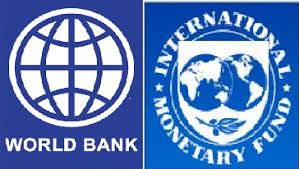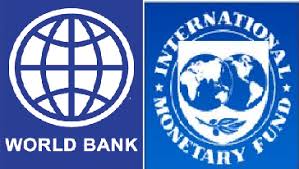
Countries should keep their trade open amid the novel coronavirus pandemic, the International Monetary Fund (IMF) and the World Bank has said, and warned that countries doing so could face counterproductive consequences of such polices.
The current global scenario is not at all conducive to restrict the trading of medical supplies and essential equipment around the world, said IMF Chief Economist Gita Gopinath while talking ot reporters at a virtual press conference during the just-concluded spring meetings of the two multilateral institutions.
"It is very important that this does not become a future where we reverse all the gains that we've got from globalization," said Gopinath.
Trade restrictions on medical and health products should be avoided by countries in order to make sure that such supplies reach places where they are needed the most, said Kenneth Kang, deputy director of the Asia and Pacific Department at the IMF, to the media recently.
"Countries with limited health care capacity and resources will need international aid to prepare for and weather the pandemic," Kang said. "The health emergency is a powerful reminder of the need for policy coordination and solidarity in an interconnected world," he said.
Tariff and non-tariff barriers that impede cross-border trade and investments should be reduced by countries and instead they should cooperate while supporting the rebounding of the global supply chain, said the IMF official.
It is hoped that the global supply chains will function as best as they could amid the pandemic so that global production and supply is maximized and that essentially entails closer flobal cooperation, said Zhang Tao, deputy managing director of the IMF.
"Today more than ever, the global economy would benefit from a more open, stable, and transparent, rules-based international trade system," Zhang said.
It is incumbent upon big countries to take steps to ensure that the current crisis is not used to close or block the markets, said World Bank President David Malpass at the virtual press conference.
"We should allow markets to function, markets to clear and the supplies to go to those most in need," said Malpass. He added that the export of medical equipment to the rest of the world by China was "very welcome."
These comments about free trade were made by executives of the IMF and the World Bank were made at a time when there was a growing trend of protectionist sentiments across the globe as the novel coronavirus ravages through many of the largest economies of the world.
According to a report by Global Trade Alert, a trade policy monitoring initiative, which was published on March 23, since the beginning of the year, 54 government across the world have imposed 46 export curbs on medical supplies.
The report showed that 33 of those restrictions on exports were announced since the beginning of March which is "an indication of just how quickly new trade limits are spreading across the globe."
While one can understand the logic behind export of some products, these actions are "almost always counterproductive", said Aaditya Mattoo, chief economist for East Asia and the Pacific Region at the World Bank.
"If each country imposes restrictions, then the global price increases even more than it would have. And it can end up being a self-defeating policy," Mattoo said at a recent press conference.
The World Bank economist also noted that such measures would hit those countries who rely on these badly needed medical supplies, especially poor countries, which import a lot of drugs, ventilators and masks.
Despite that, Jeffrey Sachs, a renowned economics professor at Columbia University, told Xinhua that he thinks there will be more protectionism in Western countries, both in the United States and the Europe.
China will have to work hard to secure long-term supply chains and two-way trade, including with Association of Southeast Asian Nations (ASEAN), Africa and South America, said Sachs, also a senior United Nations advisor.
"I believe that China, Japan, (South) Korea, and ASEAN should work hard for a swift recovery and open trade amongst themselves," said Sachs. "East Asia could be back in business because East Asia never lost control of the epidemic."
As the global economy is on track to shrink "sharply" by 3 percent this year due to the pandemic, the IMF chief economist highlighted the importance of keeping trade open in global recovery.
"The world needs a healthy recovery. It needs a strong recovery. And that will not come about if the world de-globalizes because that would severely reduce productivity in the world," Gopinath said. "And that's the last thing we want at this time."
(Source:www.xinhuanet.com)
The current global scenario is not at all conducive to restrict the trading of medical supplies and essential equipment around the world, said IMF Chief Economist Gita Gopinath while talking ot reporters at a virtual press conference during the just-concluded spring meetings of the two multilateral institutions.
"It is very important that this does not become a future where we reverse all the gains that we've got from globalization," said Gopinath.
Trade restrictions on medical and health products should be avoided by countries in order to make sure that such supplies reach places where they are needed the most, said Kenneth Kang, deputy director of the Asia and Pacific Department at the IMF, to the media recently.
"Countries with limited health care capacity and resources will need international aid to prepare for and weather the pandemic," Kang said. "The health emergency is a powerful reminder of the need for policy coordination and solidarity in an interconnected world," he said.
Tariff and non-tariff barriers that impede cross-border trade and investments should be reduced by countries and instead they should cooperate while supporting the rebounding of the global supply chain, said the IMF official.
It is hoped that the global supply chains will function as best as they could amid the pandemic so that global production and supply is maximized and that essentially entails closer flobal cooperation, said Zhang Tao, deputy managing director of the IMF.
"Today more than ever, the global economy would benefit from a more open, stable, and transparent, rules-based international trade system," Zhang said.
It is incumbent upon big countries to take steps to ensure that the current crisis is not used to close or block the markets, said World Bank President David Malpass at the virtual press conference.
"We should allow markets to function, markets to clear and the supplies to go to those most in need," said Malpass. He added that the export of medical equipment to the rest of the world by China was "very welcome."
These comments about free trade were made by executives of the IMF and the World Bank were made at a time when there was a growing trend of protectionist sentiments across the globe as the novel coronavirus ravages through many of the largest economies of the world.
According to a report by Global Trade Alert, a trade policy monitoring initiative, which was published on March 23, since the beginning of the year, 54 government across the world have imposed 46 export curbs on medical supplies.
The report showed that 33 of those restrictions on exports were announced since the beginning of March which is "an indication of just how quickly new trade limits are spreading across the globe."
While one can understand the logic behind export of some products, these actions are "almost always counterproductive", said Aaditya Mattoo, chief economist for East Asia and the Pacific Region at the World Bank.
"If each country imposes restrictions, then the global price increases even more than it would have. And it can end up being a self-defeating policy," Mattoo said at a recent press conference.
The World Bank economist also noted that such measures would hit those countries who rely on these badly needed medical supplies, especially poor countries, which import a lot of drugs, ventilators and masks.
Despite that, Jeffrey Sachs, a renowned economics professor at Columbia University, told Xinhua that he thinks there will be more protectionism in Western countries, both in the United States and the Europe.
China will have to work hard to secure long-term supply chains and two-way trade, including with Association of Southeast Asian Nations (ASEAN), Africa and South America, said Sachs, also a senior United Nations advisor.
"I believe that China, Japan, (South) Korea, and ASEAN should work hard for a swift recovery and open trade amongst themselves," said Sachs. "East Asia could be back in business because East Asia never lost control of the epidemic."
As the global economy is on track to shrink "sharply" by 3 percent this year due to the pandemic, the IMF chief economist highlighted the importance of keeping trade open in global recovery.
"The world needs a healthy recovery. It needs a strong recovery. And that will not come about if the world de-globalizes because that would severely reduce productivity in the world," Gopinath said. "And that's the last thing we want at this time."
(Source:www.xinhuanet.com)














